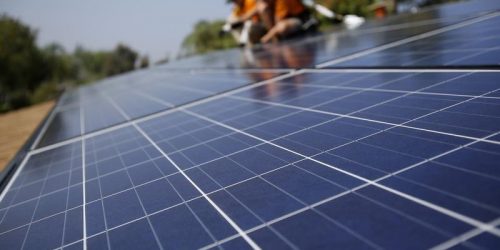PESHAWAR:
Haunted by its power crisis, Pakistan is all set to roll out its first locally manufactured solar power panels.
The production of the third-generation solar power panels by a department of the University of Engineering and Technology, is all set to start next month.
“We are launching our production and will deliver our first order for generating 2MW power very soon,” said Dr Najeeb Ullah, who leads the research at the university.
According to Dr Najeeb, the country currently generates 6% of the total power from wind and solar projects. However, the panels used to generate energy are imported and not as productive as the one being manufactured by the university’s Center for Advanced Studies in Energy.
An assessment by the International Energy Agency, a Paris-based autonomous intergovernmental organization suggests that Pakistan’s total energy consumption could cross the 49,000MW by 2025 due to the increase in the population. At present, the average demand stands at 19,000MW against the generation of around 15,000MW. The demand peaks during summer when the country needs 20,000MW. Unable to meet the requirement, which happens to be more than the production, the country ends up suffering from what is commonly known as power cuts.
The newly conceived panels, Dr Najeeb claimed, are expected to cut the power generation cost significantly. “The panels being used for power generation costs around Rs60 per watt. We will produce AAA quality power panels which will bring the production cost to Rs48 per watt and eventually to Rs10 per watt,” claimed Dr Najeeb.
Other than being cost-effective, the power panels also come with an extended lifespan. The product, Dr Najeeb said, could last anywhere between 15 and 20 years.
Experts believe solar power generation is the most feasible solution for Pakistan’s energy crisis, that is expected to intensify as the population increases. “Solar is the future. Unfortunately, the existing rental power stations prevent the investment into this sector,” said one expert. Solar power generation, he said, is a necessity. “You need to produce the panels locally,” he added.
With the exception of a chemical, Dr Najeeb’s centre is producing the entire third-generation panel locally. These panels, an expert explained, are able to produce high efficiency photon to electricity conversion devices at a cheaper production cost. “The production of the third-generation solar cell is cheaper, and the cells are reasonably efficient,” he explained.
Dr Najeeb said the units will be able to produce power even during extreme weather conditions. “These are environment friendly units. We expect them to function even at -40’C,” he said.
Commenting on the production of solar power panels, Kamran Bangash, who serves as Special Assistant to the Chief Minister said: “It is time to provide more energy generation options to the public.”
The mass production of solar power panels, Bangash said, will create more jobs and perhaps even contribute to economic revival in the long run.





